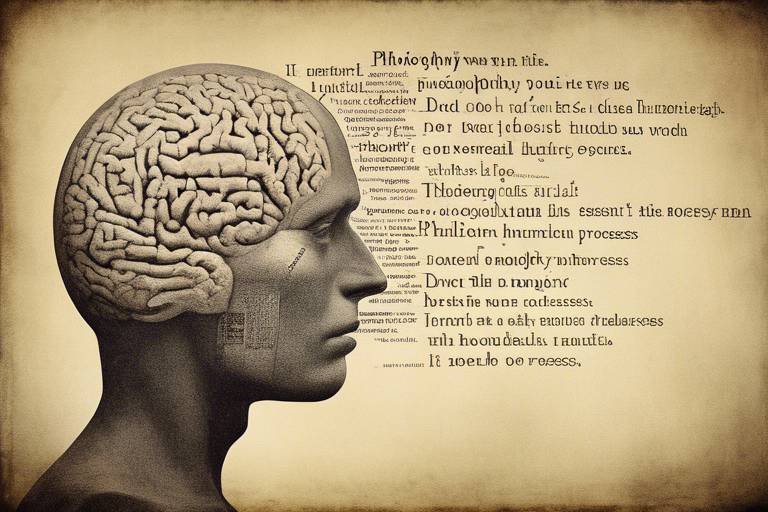The Philosophy of Mind and Spiritual Enlightenment
The relationship between the philosophy of mind and spiritual enlightenment is a fascinating and intricate web that weaves together our understanding of consciousness, perception, and the very essence of existence. Have you ever wondered what makes you, *you*? Or why we feel compelled to seek something greater than ourselves? These questions sit at the heart of both philosophical inquiry and spiritual exploration. In this article, we will embark on a journey through the rich landscape of thought that connects these two realms, revealing how our mental frameworks shape our spiritual quests and vice versa.
At the core of this exploration is the nature of consciousness. What is consciousness? Is it merely a byproduct of brain activity, or is it something more profound? Theories abound, from the idea that consciousness is an emergent property of complex systems to the belief that it is a fundamental aspect of the universe. Each perspective offers a unique lens through which to examine our spiritual experiences. For instance, if consciousness is indeed a universal phenomenon, could it be that our spiritual awakenings are moments of tapping into a greater collective awareness?
As we delve deeper, we encounter the mind-body problem, a philosophical conundrum that asks how our mental states relate to our physical existence. This dilemma has sparked countless debates and theories, from the classic dualism of Descartes to contemporary materialist viewpoints. Each stance carries profound implications for how we approach spiritual practices. Are we merely physical beings having occasional spiritual experiences, or is there a deeper connection between our minds and our spiritual journeys?
In examining these questions, we must also consider perception and how it shapes our understanding of reality. Our perceptions color our experiences and beliefs, often leading us to either profound insights or misguided illusions. The phenomenological approach emphasizes the subjective nature of experience, suggesting that our individual interpretations of reality are as important as any objective truth. This perspective can enhance our spiritual practices by encouraging a deeper self-awareness and reflection on our inner experiences.
Moreover, the concept of illusion plays a pivotal role in spiritual enlightenment. Many spiritual traditions teach that what we perceive as reality is often an illusion, a veil that obscures the true nature of existence. By recognizing these illusions—whether they be societal constructs, personal fears, or limiting beliefs—we can begin to peel back the layers of our consciousness and move towards a more profound understanding of ourselves and the universe.
Finally, we must address the realm of metaphysics, which delves into the fundamental nature of reality and existence. Metaphysical beliefs profoundly shape our spiritual outlook and can either support or hinder our quest for enlightenment. For instance, existentialism challenges us to confront the inherent meaninglessness of life, pushing us to create our own purpose and authenticity. This search for meaning is not just an intellectual exercise; it is a deeply spiritual journey that can lead to significant personal growth.
In contrast, transcendental philosophy invites us to tap into our innate knowledge and intuition, suggesting that enlightenment is not just a destination but a process of awakening to the truths that lie within us. By exploring these metaphysical frameworks, we can uncover the deeper connections between our minds and our spiritual paths.
- What is the philosophy of mind? The philosophy of mind studies the nature of the mind, consciousness, and their relationship to the physical body.
- How does consciousness relate to spiritual enlightenment? Understanding consciousness can deepen our spiritual experiences and lead to greater self-awareness and enlightenment.
- What are dualism and physicalism? Dualism posits that mind and body are distinct entities, while physicalism argues that mental states are entirely reducible to physical processes.
- Why is perception important in spirituality? Perception shapes our understanding of reality, influencing our beliefs and experiences in our spiritual journeys.
- How do metaphysical beliefs impact spiritual growth? Metaphysical beliefs can provide a framework for understanding existence and guide our pursuit of meaning and enlightenment.

The Nature of Consciousness
Understanding consciousness is vital in the philosophy of mind. It's like peeling an onion; each layer reveals more complexity, and sometimes it makes you cry! At its core, consciousness is our awareness of ourselves and our surroundings. But what does that really mean? Are we merely the sum of our thoughts, or is there something deeper at play? This section delves into various theories of consciousness, exploring how they relate to spiritual experiences and the quest for enlightenment.
Many philosophers have tried to define consciousness, and their theories can be categorized into several frameworks. For instance, some argue that consciousness is a byproduct of brain activity, while others suggest it transcends the physical realm. These contrasting views can leave us feeling like we're caught in a philosophical tug-of-war. Yet, this very struggle can lead to profound insights about our spiritual journeys.
One popular theory is the integrated information theory, which posits that consciousness arises from the integration of information across different neural networks. Imagine a symphony orchestra; each musician plays a part, but it’s the harmony that creates the music. Similarly, our conscious experience is a harmonious blend of various brain processes coming together. This perspective aligns well with many spiritual practices that emphasize the interconnectedness of all things.
Another intriguing perspective comes from the field of phenomenology. This approach emphasizes the subjective experience of consciousness. Think about your last moment of awe—perhaps witnessing a breathtaking sunset or feeling a deep connection with someone. These moments highlight how our consciousness shapes our perception of reality. In spiritual contexts, such experiences are often seen as gateways to enlightenment, urging us to explore the depths of our being.
However, consciousness is not just about awareness; it also involves introspection. This self-reflective aspect allows us to examine our thoughts and feelings, leading to greater self-awareness. It’s akin to holding a mirror up to our soul, revealing truths we may not have been ready to face. This journey inward is crucial for anyone seeking spiritual growth and enlightenment.
In summary, the nature of consciousness is a multifaceted topic that intertwines with our spiritual quests. By exploring various theories, we can gain insights that enhance our understanding of existence and self-realization. Are we merely observers of our thoughts, or do we have the power to shape our consciousness? This question invites us to embark on a journey of exploration, leading to a deeper comprehension of our place in the universe.
- What is consciousness? Consciousness refers to our awareness of ourselves and our surroundings, encompassing thoughts, feelings, and perceptions.
- How does consciousness relate to spirituality? Many spiritual practices emphasize the importance of self-awareness and introspection, which are integral to understanding consciousness.
- What are some theories of consciousness? Various theories include integrated information theory, phenomenology, and dualism, each offering unique insights into the nature of consciousness.

The Mind-Body Problem
The mind-body problem is one of the most intriguing and perplexing issues in philosophy, raising fundamental questions about the relationship between our mental states and the physical world. Imagine for a moment that your mind is like a vibrant, colorful painting, while your body is the canvas on which it rests. How do these two distinct entities interact? Are they separate, or is there a deeper connection that binds them together? This question has puzzled philosophers for centuries and continues to spark debates that shape our understanding of consciousness and existence.
At the heart of the mind-body problem lies a fundamental inquiry: How do our thoughts, feelings, and perceptions relate to the physical processes occurring in our brains and bodies? This relationship is not just a matter of academic interest; it has profound implications for our spiritual practices and self-awareness. For instance, if we view the mind and body as entirely separate, as suggested by dualism, we might approach spiritual enlightenment as a journey that transcends the physical realm. On the other hand, if we adopt a physicalist perspective, we could argue that our mental experiences are merely byproducts of biological processes, potentially diminishing the spiritual significance of our consciousness.
To navigate the complexities of the mind-body problem, we must explore two contrasting views: dualism and physicalism. Dualism, famously championed by René Descartes, posits that the mind and body are fundamentally different substances. This perspective suggests that our mental states exist independently of our physical form, allowing for the possibility of an afterlife or spiritual existence beyond our corporeal bodies. In contrast, physicalism argues that everything about the mind can be explained in terms of physical processes. This perspective challenges traditional spiritual beliefs by suggesting that our thoughts and emotions are simply the result of neural activity.
René Descartes' dualism has left an indelible mark on philosophical and spiritual thought. By asserting the separation of mind and body, Descartes opened the door to discussions about the soul, consciousness, and existence beyond the physical. His famous dictum, "I think, therefore I am," emphasizes the significance of self-awareness and thought as the foundation of existence. This view encourages individuals to seek spiritual enlightenment by transcending the physical world and connecting with a higher reality.
On the flip side, materialist perspectives challenge the notion of a distinct mind separate from the body. Advocates of this view argue that mental states are reducible to physical processes within the brain. This perspective raises questions about the validity of spiritual experiences and the nature of consciousness itself. If our thoughts and feelings are merely the result of chemical reactions and neural pathways, what does that mean for our quest for enlightenment? Does it undermine the significance of our spiritual practices, or can we find a deeper understanding within this framework?
Amidst the dualism versus physicalism debate, integrative approaches emerge as a promising avenue for reconciling these seemingly opposing views. These frameworks seek to understand the mind-body relationship as a dynamic interplay rather than a strict dichotomy. By acknowledging the complexities of human experience, integrative approaches can enhance our spiritual understanding and personal growth. For instance, practices such as meditation and mindfulness can bridge the gap between the mental and physical, fostering a holistic view of self-realization.
Ultimately, the mind-body problem invites us to explore the depths of our consciousness and the nature of existence itself. As we navigate this intricate relationship, we may discover that our spiritual journey is not just about transcending the physical but also about embracing the profound connections that bind our minds and bodies together.
- What is the mind-body problem? The mind-body problem explores the relationship between mental states and physical processes, questioning how they interact and influence one another.
- What are the main perspectives on the mind-body relationship? The two primary perspectives are dualism, which posits a separation between mind and body, and physicalism, which argues that mental states are reducible to physical processes.
- How does the mind-body problem relate to spiritual enlightenment? The mind-body problem influences how we understand consciousness and existence, impacting our spiritual practices and beliefs about self-realization.
- Can integrative approaches bridge the gap between dualism and physicalism? Yes, integrative approaches seek to reconcile these views by recognizing the dynamic interplay between mind and body, enhancing our spiritual understanding.

Dualism vs. Physicalism
When we dive into the philosophical waters of dualism and physicalism, we find ourselves navigating some of the most profound questions about our existence. At its core, dualism posits that the mind and body are fundamentally different substances. Think of it as a two-lane highway where the mind travels on one lane and the body on another, each with its own rules and regulations. This perspective, famously championed by René Descartes, suggests that our mental experiences—thoughts, feelings, and consciousness—are distinct from our physical bodies. In contrast, physicalism argues that everything about the mind can be explained in terms of physical processes. Imagine a single-lane road where everything, including thoughts and emotions, can be traced back to the physical interactions of neurons and chemicals in the brain.
The implications of these perspectives are vast and can significantly influence our understanding of spirituality and self-awareness. For instance, adherents of dualism may find it easier to embrace spiritual practices that emphasize the soul or spirit as separate from the physical body. They might argue that spiritual enlightenment involves transcending the physical realm to connect with a higher state of consciousness. On the other hand, physicalists may challenge these notions, suggesting that what we perceive as spiritual experiences are merely complex brain functions. This raises questions: Can spirituality exist without a physical basis? Or are our spiritual experiences simply illusions created by our brains?
To further illustrate these contrasting views, consider the following table:
| Aspect | Dualism | Physicalism |
|---|---|---|
| Definition | Mental and physical are separate | Mental states are physical processes |
| Spiritual Implications | Supports belief in an immortal soul | Challenges traditional spiritual concepts |
| Philosophical Roots | Descartes, Plato | Modern neuroscience, behaviorism |
Both dualism and physicalism offer compelling insights, yet neither provides a complete picture. The debate raises essential questions about the nature of consciousness and our understanding of spiritual enlightenment. For instance, if we accept dualism, does that mean our spiritual journeys are inherently disconnected from our physical experiences? Conversely, if we lean towards physicalism, how do we account for the profound, often transformative experiences that people report during moments of spiritual awakening?
Ultimately, the interplay between dualism and physicalism invites us to reflect on our beliefs about existence and self-realization. It encourages us to explore the depths of our consciousness while remaining open to the mysteries that lie beyond our physical understanding. As we continue our journey towards spiritual enlightenment, we must ask ourselves: How do these philosophical frameworks shape our personal experiences and beliefs? What role does our understanding of the mind-body relationship play in our quest for meaning?
Q1: What is dualism?
A1: Dualism is the philosophical view that the mind and body are two distinct entities, with the mind being non-physical and the body being physical.
Q2: How does physicalism differ from dualism?
A2: Physicalism asserts that everything about the mind can be explained by physical processes, suggesting that mental states are reducible to brain activity.
Q3: Can spirituality exist within a physicalist framework?
A3: Yes, many argue that spiritual experiences can be understood as complex brain functions, while others maintain that spirituality transcends physical explanations.
Q4: What are the implications of these philosophies for spiritual practices?
A4: Dualism may encourage practices that focus on the soul or spirit, while physicalism can challenge traditional beliefs about spirituality and encourage a more scientific view of consciousness.

Descartes' Dualism
René Descartes, a towering figure in the realm of philosophy, introduced a groundbreaking concept known as dualism, which posits a distinct separation between the mind and the body. This idea, often encapsulated in his famous dictum, "Cogito, ergo sum" (I think, therefore I am), suggests that our mental states are fundamentally different from our physical states. But what does this really mean for our understanding of consciousness and spiritual enlightenment?
At its core, Descartes' dualism implies that the mind, characterized by thoughts, emotions, and consciousness, cannot be fully explained by physical processes alone. Imagine your mind as a vast ocean of thoughts and experiences, while your body is merely the shore that frames it. This metaphor illustrates how the two can exist independently yet interact in profound ways. The implications of this separation are far-reaching, especially when we consider the nature of spiritual experiences.
One of the most compelling aspects of Descartes' philosophy is its historical significance. During the 17th century, when scientific materialism began to take root, Descartes provided a counter-narrative that emphasized the importance of subjective experience. His ideas paved the way for later thinkers to explore the complexities of consciousness and its relationship to the physical world. In fact, many contemporary spiritual practices, which often emphasize mindfulness and introspection, can trace their philosophical roots back to Descartes' assertions.
However, Descartes' dualism is not without its critics. Some argue that this separation leads to a fragmented understanding of human experience. For instance, how can we reconcile the feeling of joy, which is undeniably a mental state, with the biological processes that occur in our brains and bodies? This question brings us to the heart of the mind-body problem, a central theme in the philosophy of mind.
To further illustrate the impact of Descartes' dualism on spiritual thought, consider the following points:
- Spiritual Practices: Many spiritual traditions emphasize the importance of transcending the physical body to achieve higher states of consciousness, a notion that aligns with Descartes' idea of the mind as separate from the body.
- Self-Realization: The quest for self-awareness often involves introspective practices that echo Descartes' emphasis on the mind's role in shaping our reality.
- Philosophical Debates: Descartes' dualism has sparked ongoing debates in philosophy and psychology, influencing how we understand mental health and spiritual well-being.
In conclusion, Descartes' dualism offers a fascinating lens through which we can explore the intricate relationship between the mind and body. While it has its limitations and has faced substantial criticism, it undeniably serves as a cornerstone for discussions about consciousness and spiritual enlightenment. As we continue to navigate the complexities of existence, Descartes reminds us that our thoughts and experiences are not merely products of our physical being but are integral to our journey toward self-realization.
- What is Descartes' dualism? Descartes' dualism is the philosophical view that the mind and body are distinct and separate entities.
- How does dualism relate to spirituality? Dualism suggests that spiritual experiences are tied to the non-physical aspects of our being, emphasizing the importance of the mind in spiritual practices.
- What are the criticisms of Descartes' dualism? Critics argue that dualism may lead to a fragmented understanding of human experience, as it separates mental states from physical processes.

Materialist Perspectives
Materialist perspectives present a compelling viewpoint in the ongoing dialogue about the nature of consciousness and its relationship to the physical world. At its core, materialism posits that everything that exists is ultimately reducible to physical matter and its interactions. This view challenges the more traditional spiritual concepts that often emphasize the existence of a non-material realm or essence. In essence, if everything is made of matter, what does that mean for our spiritual beliefs? It raises questions about the very foundation of what we consider to be consciousness and self-awareness.
One of the most intriguing aspects of materialist perspectives is their insistence on empirical evidence. Materialists argue that mental states—thoughts, emotions, and consciousness itself—are products of physical processes in the brain. This viewpoint is often illustrated through the advancements in neuroscience, which have made remarkable strides in mapping brain activity to specific thoughts and feelings. For instance, studies have shown that certain neural pathways are activated during experiences of joy or sadness, suggesting a direct correlation between brain function and emotional states. This leads to a rather startling implication: if our thoughts and feelings are merely the byproducts of chemical reactions and electrical impulses, can we still hold onto the notion of a separate, non-material self?
However, materialism isn't without its critics. Many argue that this perspective fails to account for the richness of human experience. While materialists may assert that emotions can be traced back to brain chemistry, they often overlook the subjective quality of these experiences. For example, the feeling of love or the experience of awe in nature cannot be fully encapsulated by mere biological processes. This brings us to an important intersection between materialism and spirituality: the recognition that while our brains may be the hardware, the software—the rich tapestry of our experiences—cannot be ignored.
Moreover, the implications of materialist perspectives extend into the realm of spiritual practices. If one subscribes to a materialist view, practices such as meditation or mindfulness may be interpreted through the lens of neuroplasticity, where the brain adapts and changes in response to these practices. This can lead to profound personal growth and self-awareness, but it also raises questions about the ultimate purpose of such practices. Are they merely exercises in brain training, or do they serve a higher spiritual purpose?
In summary, while materialist perspectives offer a scientifically grounded approach to understanding consciousness, they also challenge us to reconsider the essence of our spiritual beliefs. They invite a dialogue between science and spirituality, suggesting that perhaps the truth lies somewhere in the middle. As we continue to explore the depths of consciousness, it is crucial to remain open to the complexities that define our existence, acknowledging both the physical and the experiential aspects of being human.
Frequently Asked Questions
- What is materialism in the context of philosophy? Materialism is the philosophical viewpoint that everything that exists is made of matter and that all phenomena, including consciousness, can be explained through physical processes.
- How does materialism challenge spiritual beliefs? Materialism suggests that mental states are reducible to physical processes, which raises questions about the existence of a non-material self or soul, often central to many spiritual beliefs.
- Can spiritual practices still be meaningful within a materialist framework? Yes, many argue that practices such as meditation can lead to personal growth and self-awareness, even if interpreted through a materialist lens focused on brain function.

Integrative Approaches
When we dive into the complex waters of the mind-body relationship, we often find ourselves grappling with the dichotomy of dualism and physicalism. However, there exists a fascinating realm of that seeks to bridge this divide. These approaches invite us to consider a more holistic understanding of consciousness, one that acknowledges the intricate interplay between our mental states and physical realities. Imagine trying to solve a puzzle where some pieces seem to belong to one picture while others fit into a completely different one. Integrative approaches are like the guiding hand that helps you see how those pieces can form a cohesive image.
At the heart of these integrative frameworks is the recognition that both mind and body are essential components of our existence. Rather than viewing them as opposing forces, integrative approaches suggest that they can coexist and even enhance one another. For instance, practices like meditation and mindfulness serve as prime examples of how we can cultivate awareness of our mental processes while simultaneously grounding ourselves in the physical world. These practices encourage us to observe our thoughts without judgment, allowing us to experience a deeper connection to both ourselves and the universe.
One of the most intriguing aspects of integrative approaches is their ability to foster personal growth. By embracing a comprehensive perspective, individuals can explore their spiritual paths with greater clarity and purpose. This exploration often leads to transformative experiences, where one can transcend the limitations imposed by rigid beliefs about the mind and body. Just as a river flows more freely when it is not obstructed by rocks, our spiritual journeys can flourish when we allow for a fluid understanding of consciousness.
Moreover, integrative approaches often draw from various philosophical traditions, creating a rich tapestry of insights that can guide us on our quest for enlightenment. For example, Eastern philosophies like Buddhism emphasize the interconnectedness of all things, while Western philosophies like existentialism focus on individual meaning-making. By synthesizing these diverse perspectives, we can cultivate a more profound understanding of our existence and our place within the cosmos.
In practical terms, this integration can manifest in various ways. Here are a few examples:
- Mindfulness Meditation: This practice encourages individuals to focus on the present moment, cultivating awareness of both thoughts and bodily sensations.
- Yoga: Combining physical postures with breath control and meditation, yoga serves as a powerful tool for integrating mind and body.
- Holistic Therapies: Approaches like acupuncture and energy healing emphasize the balance between physical health and mental well-being.
Ultimately, integrative approaches offer a path toward a more authentic and fulfilling spiritual experience. They remind us that our journey is not about choosing one side over the other but rather about embracing the rich complexity of our existence. As we explore these integrative frameworks, we can unlock new dimensions of self-awareness and enlightenment, paving the way for a more harmonious relationship between our minds and bodies.
Q1: What are integrative approaches in the context of spirituality?
A1: Integrative approaches refer to methods that combine various philosophical and spiritual perspectives to create a holistic understanding of consciousness, emphasizing the interconnectedness of mind and body.
Q2: How can mindfulness practices enhance spiritual growth?
A2: Mindfulness practices, such as meditation, help individuals become more aware of their thoughts and feelings, fostering a deeper connection to themselves and their spiritual paths.
Q3: Can integrative approaches help resolve the mind-body problem?
A3: While they may not completely resolve the mind-body problem, integrative approaches provide valuable insights that encourage a more harmonious relationship between mental and physical experiences.
Q4: Are there specific traditions that contribute to integrative approaches?
A4: Yes, integrative approaches often draw from various traditions, including Eastern philosophies like Buddhism and Western philosophies like existentialism, to create a comprehensive understanding of spirituality.

Perception and Reality
Perception is like a lens through which we view the world, shaping not only our understanding of reality but also our spiritual beliefs. Imagine walking into a room filled with vibrant colors and sounds; your senses come alive, creating a unique experience that feels real. But what if I told you that this experience is subjective? Yes, our perceptions can differ vastly from one person to another, leading us to question: what is the true nature of reality? This question sits at the heart of philosophical inquiry and spiritual exploration.
In the realm of spirituality, perception plays a crucial role. It influences how we interpret our experiences and understand our place in the universe. For instance, two individuals might witness the same sunset: one might see it as a reminder of the beauty of life, while the other might be consumed by feelings of sadness. This divergence highlights the idea that our perceptions are colored by our emotions, beliefs, and past experiences. The question arises: can we transcend our subjective perceptions to grasp a more universal reality?
Philosophers have long debated the relationship between perception and reality. Some argue that our perceptions are mere illusions, shaped by our minds and senses, while others suggest that they provide genuine insights into the nature of existence. To illustrate this, let’s consider a few philosophical perspectives:
| Philosophical Perspective | Key Idea |
|---|---|
| Empiricism | Knowledge comes primarily from sensory experience. |
| Idealism | Reality is fundamentally mental and immaterial. |
| Realism | The world exists independently of our perceptions. |
These perspectives offer a glimpse into the complexity of perception. For example, empiricism emphasizes the importance of sensory experience, suggesting that our understanding of reality is rooted in what we can see, hear, and touch. In contrast, idealism posits that the mind shapes reality, indicating that our perceptions might not reflect an objective truth. Realism, on the other hand, asserts that there is a reality that exists regardless of our perceptions, challenging us to consider whether we can ever truly know it.
As we navigate these philosophical waters, we must also consider the implications for our spiritual journey. When we recognize that our perceptions are not absolute, we open ourselves to the possibility of transformation. Enlightenment often involves a shift in perception—seeing beyond the illusions that cloud our understanding. This is where spiritual practices, such as meditation and mindfulness, come into play. They help us cultivate awareness of our thoughts and feelings, allowing us to discern between what is real and what is merely a projection of our minds.
Furthermore, the concept of illusion is pivotal in many spiritual traditions. For instance, in Buddhism, the idea of 'Maya' refers to the illusory nature of the world. By recognizing the transient and deceptive nature of our perceptions, we can begin to peel back the layers of reality and uncover deeper truths about existence. This journey often leads to profound insights, as individuals learn to let go of preconceived notions and embrace the fluidity of life.
Ultimately, the interplay between perception and reality is a dance that invites us to explore our consciousness and spiritual beliefs. By questioning our perceptions and seeking deeper understanding, we embark on a path of self-discovery that can lead to enlightenment. So, the next time you encounter a moment that feels significant, take a step back and ask yourself: what is this experience teaching me about reality and my place within it?
- What is the difference between perception and reality?
Perception is how we interpret our experiences, while reality refers to the actual state of things, independent of our interpretations. - How can I change my perception?
Engaging in mindfulness practices, such as meditation, can help you become more aware of your thoughts and feelings, allowing for a shift in perception. - Is there a universal reality?
This is a debated topic in philosophy; some argue that there is an objective reality, while others believe that reality is shaped by individual perceptions.

Phenomenology of Experience
When we dive into the , we're essentially peeling back the layers of our consciousness to examine how we perceive the world around us. This philosophical approach emphasizes the importance of subjective experience, suggesting that our understanding of reality is deeply rooted in how we interpret our senses and emotions. Imagine standing on a beach, feeling the warm sand between your toes, hearing the waves crash, and smelling the salty air. Each of these sensations contributes to your unique experience of that moment, shaping not just your perception of the beach but also your understanding of happiness, peace, and even existence itself.
Phenomenology encourages us to explore the essence of our experiences without preconceived notions or biases. It asks us to reflect on questions like: What does it mean to truly experience something? How do our emotions and thoughts color our perceptions? By engaging in this introspective journey, we can uncover deeper insights into our spiritual lives. For instance, when we meditate, we often focus on the present moment, stripping away distractions to fully immerse ourselves in our thoughts and feelings. This practice aligns beautifully with phenomenological principles, as it cultivates a heightened awareness of our internal states.
Furthermore, phenomenology has significant implications for spiritual practices. It invites individuals to embrace their subjective realities and recognize that each person's experience is valid. This perspective can foster a sense of community among those on similar spiritual journeys, as we share our stories and insights. The beauty of phenomenology lies in its ability to bridge personal experience with universal truths, allowing us to connect with others while also delving into our own unique paths of enlightenment.
To illustrate the impact of phenomenology on spiritual practices, consider the following table that outlines key concepts:
| Concept | Description |
|---|---|
| Subjectivity | The understanding that each individual's experience is unique and valid. |
| Intentionality | The notion that consciousness is always directed towards something, shaping our experiences. |
| Embodiment | The idea that our bodily experiences influence our perception and understanding of reality. |
| Inter-subjectivity | The shared understanding and meaning that arise from social interactions and experiences. |
In conclusion, the phenomenology of experience not only enriches our understanding of consciousness but also enhances our spiritual journey. By embracing our subjective experiences, we open ourselves up to a world of deeper meaning and connection. This exploration serves as a powerful reminder that in the quest for enlightenment, our personal experiences are not just stepping stones but pathways leading us toward greater self-awareness and understanding.
- What is phenomenology? Phenomenology is a philosophical approach that focuses on the structure of experiences and consciousness, emphasizing subjective interpretation.
- How does phenomenology relate to spirituality? It encourages individuals to explore their unique experiences, fostering personal growth and deeper understanding in spiritual practices.
- Can phenomenology help in meditation? Yes, by promoting awareness of thoughts and feelings, phenomenology enhances the practice of meditation and mindfulness.
- What are some key concepts in phenomenology? Key concepts include subjectivity, intentionality, embodiment, and inter-subjectivity, all of which shape our understanding of experiences.

Illusion and Enlightenment
The journey towards spiritual enlightenment is often riddled with illusions—those deceptive layers that cloud our perception and understanding of reality. In many ways, these illusions act like a foggy window, distorting what lies beyond and making it difficult to see the truth clearly. But what if I told you that recognizing these illusions is the key to unlocking profound insights? Just as a magician reveals the secrets behind their tricks, we too can unveil the layers that obscure our true selves.
Illusions can take many forms; they can be societal constructs, personal beliefs, or even the narratives we tell ourselves. For instance, consider the illusion of separation—we often perceive ourselves as distinct entities, isolated from the universe and each other. This perception can lead to feelings of loneliness and disconnection. However, spiritual traditions across the globe emphasize the interconnectedness of all beings. When we begin to see through this illusion, we can experience a deeper sense of unity and belonging.
Moreover, the concept of illusion in spiritual enlightenment is not merely about recognizing falsehoods; it's about embracing a transformative process. Just like peeling an onion, each layer we uncover brings us closer to the core of our being. This process can be uncomfortable, as it often requires us to confront uncomfortable truths about ourselves and our lives. Yet, it is through this discomfort that we grow. Think of it as a caterpillar undergoing metamorphosis—only by breaking free from its cocoon can it emerge as a butterfly, soaring into the skies of enlightenment.
To delve deeper into this relationship between illusion and enlightenment, we can explore several key aspects:
- Awareness: The first step in overcoming illusion is developing awareness. By paying attention to our thoughts, emotions, and surroundings, we can begin to identify patterns that may not serve us. This awareness acts as a flashlight, illuminating the dark corners of our mind.
- Questioning Beliefs: Once we become aware, the next step is to question the beliefs we hold. Are they truly ours, or have we adopted them from others? This questioning can lead to a more authentic understanding of ourselves.
- Embracing Change: Finally, embracing change is crucial. Just as seasons change, so too must we adapt and evolve. Letting go of outdated beliefs allows for new growth and deeper spiritual insights.
As we journey through life, it's essential to remember that enlightenment is not a destination but a continuous process of growth and understanding. Each time we confront an illusion, we have the opportunity to expand our consciousness and deepen our connection to the universe. By recognizing the illusions that bind us, we can step into a more authentic existence, free from the constraints of misunderstanding.
In conclusion, the path to enlightenment is intricately woven with the recognition of illusion. By embracing this journey, we allow ourselves to transform and awaken to a greater reality. So, the next time you find yourself feeling lost or disconnected, ask yourself: what illusions am I holding onto? The answers may just lead you to a profound awakening.
Q: What is the role of illusion in spiritual enlightenment?
A: Illusion plays a crucial role in spiritual enlightenment as it represents the false perceptions and beliefs that cloud our understanding of reality. Recognizing and overcoming these illusions can lead to deeper insights and personal growth.
Q: How can I identify illusions in my life?
A: To identify illusions, develop awareness of your thoughts and emotions, question the beliefs you hold, and be open to change. This process can help you uncover patterns that may not serve your true self.
Q: Is enlightenment a one-time event or a continuous process?
A: Enlightenment is a continuous process rather than a one-time event. It involves ongoing growth, self-discovery, and the ability to see through layers of illusion as you navigate through life.

Metaphysics and Spirituality
Metaphysics serves as the philosophical backbone of spirituality, probing into the fundamental nature of reality and existence. It raises profound questions about what it means to be alive and how our inner experiences relate to the outer world. When we delve into metaphysical inquiries, we often find ourselves contemplating concepts like being, time, and space, which are crucial for understanding our place in the universe. Spirituality, on the other hand, is the personal journey we undertake to connect with something greater than ourselves, often seeking answers to these metaphysical questions.
One of the most intriguing aspects of metaphysics is its exploration of the nature of reality. Are we merely physical beings navigating a material world, or is there a deeper, spiritual essence that transcends our physical existence? This question invites us to reflect on our beliefs and experiences. For instance, many spiritual traditions propose that our true self is not confined to our physical bodies, suggesting that we are interconnected with a greater cosmic consciousness. This idea can be both liberating and daunting, as it challenges us to rethink our identity and purpose.
Moreover, metaphysics often intersects with concepts of time and space. In spiritual practices, time is frequently perceived as cyclical rather than linear. This perspective aligns with various cultural traditions that view life as a series of rebirths or transformations. Understanding this cyclical nature can enhance our spiritual practices, allowing us to perceive each moment as an opportunity for growth and renewal. It encourages us to embrace the present, fostering a deeper connection with our inner selves and the universe.
In addition to time, space plays a crucial role in shaping our spiritual experiences. Many philosophies posit that the universe is not just a backdrop for our lives but a dynamic entity that interacts with our consciousness. This leads to the idea that our thoughts and intentions can influence our reality. Such a perspective empowers individuals to take charge of their spiritual journeys, as it suggests that we possess the ability to manifest our desires through focused intention and awareness.
To better understand the relationship between metaphysics and spirituality, consider the following table that outlines key concepts:
| Metaphysical Concepts | Spiritual Implications |
|---|---|
| Nature of Being | Understanding our essence beyond the physical |
| Time as Cyclical | Embracing growth and renewal in every moment |
| Interconnectedness | Realizing our unity with the universe |
| Influence of Intention | Manifesting desires through focused awareness |
Ultimately, the exploration of metaphysics invites us to embark on a journey of self-discovery and enlightenment. By contemplating these profound questions, we can cultivate a deeper understanding of our existence and the universe. Spirituality, enriched by metaphysical insights, becomes a transformative practice that encourages us to seek authenticity and connection. As we navigate this intricate tapestry of thought, we may find ourselves awakening to new dimensions of reality, leading to a more profound sense of peace and purpose.
- What is the relationship between metaphysics and spirituality? Metaphysics explores the fundamental nature of reality, while spirituality is the personal journey of connecting with something greater than oneself. Together, they provide a framework for understanding our existence and purpose.
- How do metaphysical beliefs influence spiritual practices? Metaphysical beliefs shape our understanding of concepts like time, space, and interconnectedness, which can enhance our spiritual practices and deepen our self-awareness.
- Can metaphysical exploration lead to personal transformation? Yes! Engaging with metaphysical questions can lead to profound insights and personal growth, fostering a greater sense of purpose and connection.

Existentialism and Meaning
Existentialism is more than just a philosophical stance; it's a journey into the depths of human existence. At its core, existentialism grapples with the fundamental question: What is the meaning of life? This question can feel daunting, like standing at the edge of a vast abyss. However, it is this very exploration that can lead to profound spiritual growth and personal enlightenment. Existentialists argue that meaning is not something that is handed to us on a silver platter; instead, it is something we must actively create in our lives.
One of the most compelling aspects of existentialism is its emphasis on individual experience and personal responsibility. Think of it like being the captain of your own ship, navigating through the turbulent waters of life. You are responsible for charting your course, making decisions, and facing the consequences of those choices. This perspective is liberating yet daunting, as it places the weight of existence squarely on your shoulders. It challenges you to confront your fears, desires, and the inherent absurdity of life.
Existentialists like Jean-Paul Sartre and Albert Camus suggest that, in a world devoid of inherent meaning, we have the freedom to create our own purpose. Sartre famously stated, "Existence precedes essence." This means that we first exist, and through our actions and choices, we define ourselves. It's as if life is a blank canvas, and you are the artist, free to paint your own reality. This notion can be incredibly empowering, but it also demands a level of introspection and honesty that many find challenging.
Moreover, existentialism invites us to embrace the concept of authenticity. Living authentically means aligning your actions with your true self, rather than conforming to societal expectations or external pressures. It’s about being genuine in your pursuit of meaning, even if that pursuit leads you down unconventional paths. This authenticity can foster deeper connections with others, as it encourages vulnerability and openness in relationships.
In the context of spirituality, existentialism encourages individuals to seek their own truths rather than accepting dogma or tradition without question. This quest for personal truth can lead to a richer, more fulfilling spiritual experience. When you strip away the layers of societal conditioning, what remains is your raw essence—your beliefs, your values, and your unique perspective on life.
As you embark on this journey, consider the following key points that encapsulate the relationship between existentialism and meaning:
- Creation of Meaning: Embrace the idea that you are the architect of your own life.
- Personal Responsibility: Acknowledge that your choices shape your existence.
- Authenticity: Strive to live in alignment with your true self.
- Spiritual Exploration: Seek personal truths that resonate with your experiences.
In conclusion, existentialism serves as a powerful framework for understanding the complexities of meaning in life. It challenges us to look inward, to confront the uncomfortable questions, and to embrace the freedom that comes with self-definition. By doing so, we not only enrich our understanding of ourselves but also deepen our spiritual journey, leading us closer to enlightenment.
- What is existentialism? Existentialism is a philosophical movement that focuses on individual existence, freedom, and the search for meaning in an indifferent universe.
- How does existentialism relate to spirituality? Existentialism encourages individuals to seek their own truths and create their own meaning, which can lead to a more profound spiritual experience.
- Can existentialism help with personal growth? Yes, by promoting self-reflection and authenticity, existentialism can facilitate personal growth and self-awareness.
- What are some key existentialist thinkers? Notable existentialist philosophers include Jean-Paul Sartre, Albert Camus, and Søren Kierkegaard.

Transcendental Philosophy
Transcendental philosophy represents a fascinating realm where the boundaries of human understanding stretch beyond the empirical and the observable. At its core, this philosophy emphasizes the significance of intuition and innate knowledge as pathways to grasping the deeper truths of existence. Think of it as a bridge between the tangible world we perceive and the profound realities that lie just beyond our sensory experience. This approach encourages us to look beyond mere appearances and delve into the essence of what it means to be alive.
One of the most influential figures in transcendental philosophy is Immanuel Kant, who proposed that our understanding of the world is shaped by both our sensory experiences and the innate structures of our mind. According to Kant, while we can only know the world as it appears to us, there exists a realm of things-in-themselves that remains inaccessible to our senses. This idea resonates deeply with spiritual seekers who strive for enlightenment, as it suggests that true understanding transcends the physical realm. In this light, spiritual awakening can be viewed as the process of aligning ourselves with these deeper truths, moving beyond the superficial layers of reality.
Transcendental philosophy also encourages a kind of introspection that can lead to profound personal transformation. By engaging with our inner selves, we can tap into a reservoir of wisdom that exists within us. This practice often involves meditation and self-reflection, allowing us to quiet the noise of the external world and listen to the whispers of our intuition. It’s akin to tuning a radio to the right frequency; once we find that sweet spot, we can access insights that guide our spiritual journey.
Moreover, transcendental philosophy posits that our experiences of beauty, love, and connection can serve as gateways to spiritual enlightenment. When we encounter moments of profound beauty—whether in nature, art, or human relationships—we often feel a sense of transcendence that lifts us beyond our ordinary selves. These experiences remind us that there is more to life than the mundane, and they encourage us to seek deeper meanings and connections.
In summary, transcendental philosophy serves as a vital framework for those on a quest for spiritual enlightenment. It invites us to explore the depths of our consciousness, embrace our intuitive capacities, and recognize the inherent beauty of existence. By doing so, we not only enrich our own lives but also contribute to a broader understanding of the interconnectedness of all beings. This journey towards enlightenment is not merely an individual endeavor; it is a shared experience that resonates with the collective human spirit.
- What is transcendental philosophy? Transcendental philosophy focuses on the innate structures of the mind and intuition as pathways to understanding deeper truths beyond sensory experience.
- How does transcendental philosophy relate to spirituality? It emphasizes personal introspection and the search for meaning, helping individuals connect with their inner selves and the greater realities of existence.
- Who is a key figure in transcendental philosophy? Immanuel Kant is a significant philosopher in this area, known for his ideas about the limits of human understanding and the existence of things-in-themselves.
- Can transcendental philosophy enhance spiritual practices? Yes, by encouraging meditation, self-reflection, and the appreciation of beauty, it can deepen one's spiritual journey and understanding.
Frequently Asked Questions
- What is the philosophy of mind?
The philosophy of mind is a branch of philosophy that explores the nature of the mind, consciousness, and their relationship to the body. It dives deep into understanding how our mental states influence our perception of reality and our spiritual experiences.
- How does consciousness relate to spiritual enlightenment?
Consciousness plays a crucial role in spiritual enlightenment as it shapes our awareness and understanding of existence. By exploring different theories of consciousness, we can gain insights into our spiritual journeys and how we perceive our experiences.
- What is the mind-body problem?
The mind-body problem is a philosophical question that examines the relationship between mental states (thoughts, feelings, etc.) and physical processes (brain activity, bodily functions). It raises important questions about how our mental experiences affect our physical reality and vice versa.
- What are dualism and physicalism?
Dualism posits that the mind and body are distinct entities, while physicalism argues that everything about the mind can be explained through physical processes. These contrasting views have significant implications for our understanding of spirituality and self-awareness.
- How does Descartes' dualism influence spiritual thought?
René Descartes' dualism suggests a separation between the mind and body, which has shaped contemporary views on spirituality. It encourages the exploration of inner experiences and the belief that our spiritual essence exists independently of our physical form.
- What are materialist perspectives on the mind?
Materialist perspectives argue that all mental states can be reduced to physical processes in the brain. This view challenges traditional spiritual concepts by suggesting that our thoughts and feelings are merely byproducts of biological functions, potentially limiting our understanding of spiritual experiences.
- What are integrative approaches in the philosophy of mind?
Integrative approaches aim to reconcile dualism and physicalism by finding common ground between the two. These frameworks can enhance our spiritual understanding and personal growth by acknowledging the complexities of both mental and physical experiences.
- How does perception shape our reality?
Perception is the lens through which we interpret our experiences and reality. Different philosophical perspectives on perception can influence our spiritual beliefs and the way we engage with the world around us, ultimately guiding our quest for enlightenment.
- What is phenomenology and its relevance to spirituality?
Phenomenology emphasizes the importance of subjective experience and consciousness. In spirituality, it encourages individuals to explore their inner experiences deeply, fostering a greater understanding of themselves and their connection to the universe.
- How can recognizing illusions lead to enlightenment?
Recognizing illusions—those deceptive perceptions and beliefs—can lead to profound insights and transformation. By seeing through these illusions, we can attain a clearer understanding of reality, paving the way for spiritual enlightenment.
- What is the relationship between metaphysics and spirituality?
Metaphysics explores the fundamental nature of reality, which is closely intertwined with spirituality. Our metaphysical beliefs shape our understanding of existence, influencing our spiritual practices and personal enlightenment journeys.
- How does existentialism contribute to spiritual growth?
Existentialism focuses on the search for meaning in life, which is essential for spiritual growth. By confronting existential questions, individuals can pursue authenticity and deepen their spiritual journeys, discovering their true purpose.
- What does transcendental philosophy emphasize?
Transcendental philosophy emphasizes the role of intuition and innate knowledge in understanding reality. These concepts are vital for spiritual awakening, guiding individuals toward enlightenment through deeper self-awareness and connection with the universe.



















